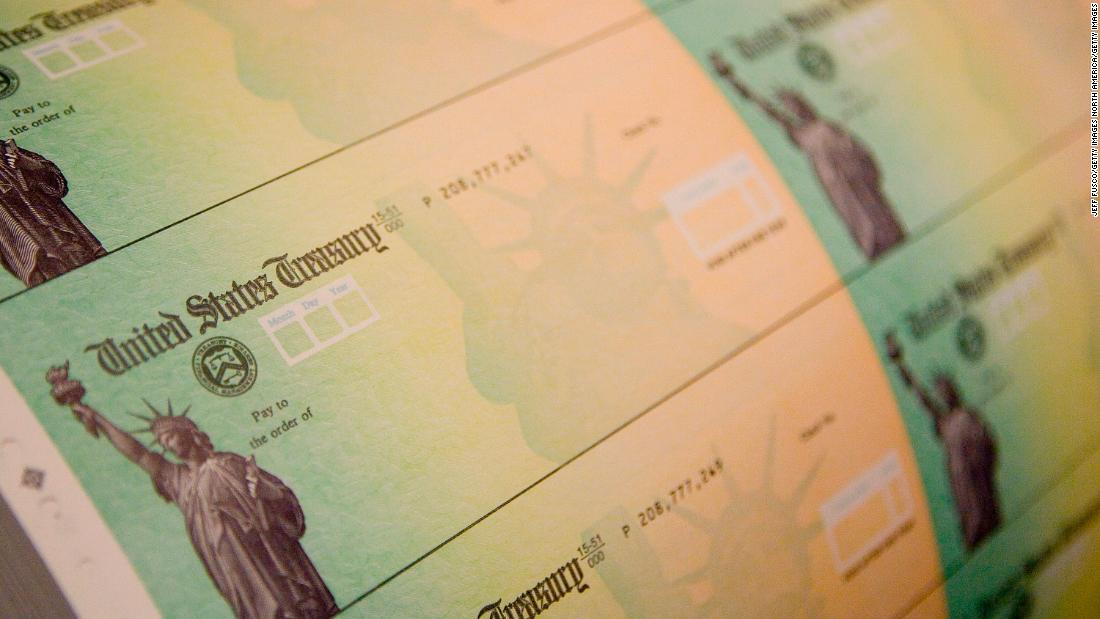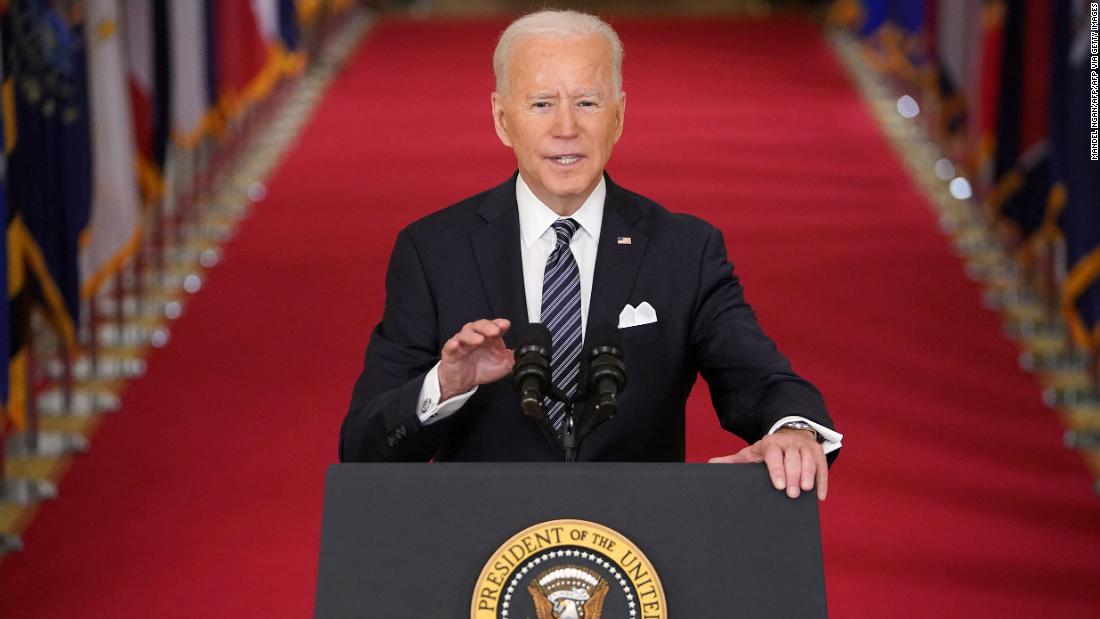Like this newsletter? Tell your friends to sign up here.
Questions? Comments? [email protected]
And follow all our latest updates.
By Ivana Kottasová, CNN
Friday, March 12
US President Joe Biden has pinned America’s hopes of a return to normal on two key dates: May 1, by when he wants all adults to be eligible to get vaccines; and July 4, when he said Americans may be able to celebrate Independence Day in person.
In his first prime-time TV address last night, Biden escalated the nation’s "war footing" to help beat the virus. He announced that he was directing all states, tribes and territories to make all adults eligible to be vaccinated by May 1, stating his administration would build out the infrastructure of clinics, vaccine doses and medical staff to make that prospect real.
But the President also asked the American people to do their part. "I will not relent until we beat this virus. But I need you, the American people ... I need every American to do their part," Biden said. "I need you to get vaccinated when it's your turn and when you can find an opportunity. And to help your family, your friends, your neighbors get vaccinated as well."
Biden sounded optimistic about the progress of the vaccination rollout. He moved his target for getting 100 million shots in peoples' arms from his first 100 days in the White House to his 60th day in office, saying the US will maintain and beat its current pace of 2 million shots per day.
According to the US Centers for Disease Control and Prevention (CDC), at least 33.9 million Americans are now fully vaccinated.
If everyone does their bit, Biden said, "By July the Fourth, there's a good chance you, your family and friends will be able to get together in your backyard or your neighborhood and have a cookout and a barbecue and celebrate Independence Day."
But this message of unity couldn’t be further away from the battles over safety measures emerging all over the country. In Texas, State Attorney General Ken Paxton is now suing leaders in Austin for maintaining local mask requirements, saying they illegally defy the governor's order ending a statewide mandate.
Paxton's lawsuit sets the stage for the latest showdown in a long-running, nationwide clash over public health rules that often breaks along political lines. Sixteen states have no statewide mask rule and there are growing divisions between local and state leaders on what public health measures should stay in place.
Experts are clear on the issue: daily case numbers in the US remain high and -- as Biden’s chief medical adviser on Covid-19 Dr. Anthony Fauci put it to CBS last night -- are "absolutely not" low enough to relax public health measures.
YOU'RE INVITED
Join us for a live discussion on Tuesday, March 16 at 10 a.m. ET
What have we learned from a year in lockdown? Join Dr. Sanjay Gupta, Dana Bash and Abby Phillip for a Q&A about vaccines, variants and the path forward. Reserve your seat now.
THE LATEST NUMBERS
Global Cases
118,671,830
Global Deaths
2,631,758
US Cases
29,286,721
US Deaths
530,826

Source: Johns Hopkins University
YOU ASKED. WE ANSWERED.
Q
If I already had Covid-19, should I still get vaccinated?
A
Yes, according to the CDC. “Due to the severe health risks associated with COVID-19 and the fact that reinfection with COVID-19 is possible, you should be vaccinated regardless of whether you already had COVID-19 infection,” the agency says.
Send your questions here. Are you a health care worker fighting Covid-19? Message us on WhatsApp about the challenges you're facing: +1 347-322-0415.
WHAT'S IMPORTANT TODAY
More nations pause AstraZeneca vaccine use as blood clot reports investigated
Denmark, Iceland and Norway have suspended the use of the Oxford-AstraZeneca Covid-19 vaccine while the European Union's medicines regulator investigates whether the shot could be linked to a number of reports of blood clots. Danish Health Minister Magnus Heunicke made clear the pause was a "precautionary measure," saying it was not possible yet to draw conclusions.
Several other European countries have suspended use of specific batches of the vaccine, including Italy, Austria, Lithuania, Estonia, Luxembourg and Latvia. The reports that people in Denmark and Austria had experienced blood clot side-effects after receiving the shot prompted Thailand’s Prime Minister Prayut Chan-o-cha to cancel plans to publicly get the AstraZeneca vaccine on Friday.
Other countries, including the United Kingdom, Spain and the Netherlands, have said that they see no reason to stop using the AstraZeneca shot.
For Britain's elderly, first touch with a relative 'means everything'
In a small nursing home by the southern English seaside, David Alexander, 89, walks into his wife's bedroom for the first time since October. Before even putting down his bags, David sits on Sheila's bed, next to her armchair, and holds her hand -- for only the second time since the pandemic came to Britain.
Throughout the pandemic, Sheila was cut off from everyone who loved her because the country’s nursing and care homes have largely remained closed to visitors. Now the UK's vaccine rollout has made an incremental but significant change possible. Phil Black and Mick Krever report on some of the first reunifications of loved ones.

David Curtis Alexander visits his wife Sheila, holding her hand for the first time in months.
(Photo: Mick Krever/CNN)
More than 1 in 5 health care workers experience depression and anxiety during the pandemic, study says
Staggering numbers of health care workers -- 21.5% -- have experienced anxiety, depression or post-traumatic stress disorder during the pandemic, global research has revealed.
Healthcare workers have been working long hours under strenuous conditions. Because of this, Nathaniel Scherer, co-lead author of the study, said he was unsurprised by the numbers. "Previous evidence has shown that these experiences can lead to stress, fatigue and burnout, which can increase the risk of common mental disorders," said Scherer, a research assistant at the London School of Hygiene and Tropical Medicine.
ON OUR RADAR
-
Scientists in Brazil have identified two cases where people were simultaneously infected with two different variants of Covid-19, according to a new study.
-
Rosie Arguello spent the past couple of months glued to her cellphone and landline, calling a hotline to get a Covid-19 vaccine. When she heard the busy signal, she called again, and again, and again.
-
To keep the University of Virginia open for students and identify potential asymptomatic cases, scientists are testing dorm wastewater for molecular remnants of the coronavirus.
-
Israel’s vaccination 'green pass' may offer a glimpse of a post-Covid future.
-
Pharmacy chain CVS has added 12 new states to its Covid-19 vaccine rollout as more supply becomes available. The company is now administering vaccines in nearly 1,200 stores across 29 states and Puerto Rico.
-
Hundreds of climbers are set to return to Mount Everest for the first time since the world’s tallest peak closed due to the pandemic.
-
"South Park" is back with an hourlong special that revolves around Cartman and the gang trying to get a vaccine for their teacher, Mrs. Nelson.
TODAY'S
TOP TIPS
Now more than ever, teachers across the world are stretched thin.
After a year of online or hybrid learning, educators continue to juggle a variety of roles -- including providing tech support to some students -- all while trying to keep safe from coronavirus.
Meanwhile, on the other side of the screen, some students and their families have struggled to keep up. The pandemic's economic fallout has devastated vulnerable families, making at-home learning even more challenging.
Fortunately, there are organizations helping teachers, students and their families during the pandemic. Here's how you can help their efforts.
FROM TODAY'S
PODCAST
"I felt like my farewells were, you know, talking to my daddy on the phone. Not that he could speak, but I know he heard me."
-- Lisa Respers France, CNN Senior Writer
With over 2.5 million global coronavirus deaths, millions more have faced the daunting task of saying goodbye to a loved one from a distance. CNN’s Chief Medical Correspondent Dr. Sanjay Gupta talks to Lisa Respers France about paying her last respects to her father, Gary Respers, Snr., who passed away from Covid-19. Listen now.
CNN
Unsubscribe | All CNN Newsletters
Want to easily manage your newsletter subscriptions? Create your account.
Access CNN's Coronavirus Resource.
® © 2021 Cable News Network, Inc.
A WarnerMedia Company. All Rights Reserved.
One CNN Center Atlanta, GA 30303


